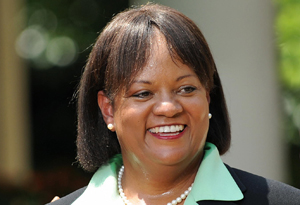5 Questions With the U.S. Surgeon General

Photo: Tim Sloan/Getty Images
Surgeon General Regina Benjamin, MD, tells O about her first year on the job.
Regina Benjamin gets it done. An Alabama native, in 1990 she opened the Bayou La Batre Rural Health Clinic to serve a disadvantaged area. When her clinic was destroyed by Hurricanes Georges and Katrina, she saved her patients' charts by drying them in the sun. And on New Year's Day 2006, when the just-renovated clinic burned to the ground, she rebuilt it with her own money and help from the community. One year ago, Benjamin was sworn in as the 18th surgeon general of the United States, responsible for "protecting and advancing the health of the nation." She took a few minutes to tell O how it's going.
O Magazine: Last January you released The Surgeon General's Vision for a Healthy and Fit Nation, in which you called on America to choose nutritious foods and get more exercise. What progress has been made?
Surgeon General Regina Benjamin: We've gotten stimulus money for a grant that will help communities combat smoking and obesity. And since so many places are "food deserts"—areas where people can get groceries only at a convenience store—we're trying to put refrigerated units in these stores so they can carry fresh foods. We're also encouraging people to head outside, so we're working to provide new sidewalks and parks. My motto is "Make the healthy choice the easy and affordable choice."
Another thing we're doing is walks around the country [a campaign called Walks for a Healthy and Fit Nation], which we've held in Baltimore, Los Angeles, Mobile, Alabama, and even the Grand Canyon—though that was a bit more than a walk! The idea is that I'm not a fitness buff, so if I can do it, anyone can.
O: In your work at the clinic, what kind of healthcare disparities did you see?
RB: I had one patient who was a custodian at the elementary school, and she had a back problem. I called in some pain medication for her, but when I saw her later she was still in pain. Turns out she didn't get the medicine because she couldn't afford the co-pay—and that same day she went back to work to strip a floor. For me, making it easier for people to get care is what health reform is about. Under the Affordable Care Act [which was passed in March], insurance plans have to cover recommended preventive services without charging a co-pay, so that's a step. But healthcare disparities will be a major issue until we eliminate them completely.
O: Do you think that's possible?
RB: It's going to take time, but yes. I'm an optimist, so I think everything's possible.
O: What's on your 2011 agenda?
RB: My brother, my mother, and my father died of preventable diseases, and I don't want anyone else to go through that. So anything I can do to prevent people from getting sick in the first place is really important, and I see a lot of that in the health reform bill. We need to transform our system from one that's based on disease and illness to one that's based on wellness and prevention.
O: We heard you also want to hike Kilimanjaro?
RB: Yes; if I can do the Grand Canyon, I can do Kilimanjaro. I hope. I mean, I can, I know I can.
Keep Reading:



